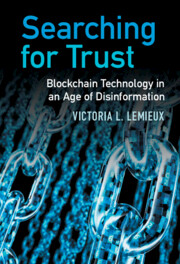Book contents
- Searching for Trust
- Searching for Trust
- Copyright page
- Dedication
- Epigraph
- Contents
- Preface
- Acknowledgments
- Part I Introduction
- Part II Trust
- 2 Trust and Its Discontents
- 3 From “Trustless Trust” to “The Great Chain of Certainty”
- Part III Disinformation
- Part IV Blockchain and Distributed Ledger Technology
- Part V The Theory of the Future
- References
- Index
3 - From “Trustless Trust” to “The Great Chain of Certainty”
from Part II - Trust
Published online by Cambridge University Press: 01 April 2022
- Searching for Trust
- Searching for Trust
- Copyright page
- Dedication
- Epigraph
- Contents
- Preface
- Acknowledgments
- Part I Introduction
- Part II Trust
- 2 Trust and Its Discontents
- 3 From “Trustless Trust” to “The Great Chain of Certainty”
- Part III Disinformation
- Part IV Blockchain and Distributed Ledger Technology
- Part V The Theory of the Future
- References
- Index
Summary
To what extent can human and institutional actors place their trust in a technology like distributed ledger technology, including blockchain? With the key role that technology increasingly plays in human trusting relationships, exploring the nature of trust in technology (and thus of trust in distributed ledgers as technical artefacts) is important. This chapter defines and explores three distinct but interrelated forms of trust applicable to blockchain technology: the notion of ‘trustless trust’; the notion of ‘user trust’; and the notion of ‘ledger trust’. In considering these three notions of trust, the chapter argues that trust relies—at least in part—upon evidence of the trustworthiness of parties to be trusted. But where does that evidence come from? One such source is records, including the ledgers that have long been used as evidence of all sorts of human transactions, especially financial ones. Distributed ledgers—which include blockchains—thus theoretically contribute to the formation of grounds for trust through affording a new form of recordkeeping that is said to assure trustworthy records as sources of evidence relating to transacting parties’ trustworthiness.
Keywords
- Type
- Chapter
- Information
- Searching for TrustBlockchain Technology in an Age of Disinformation, pp. 49 - 70Publisher: Cambridge University PressPrint publication year: 2022

